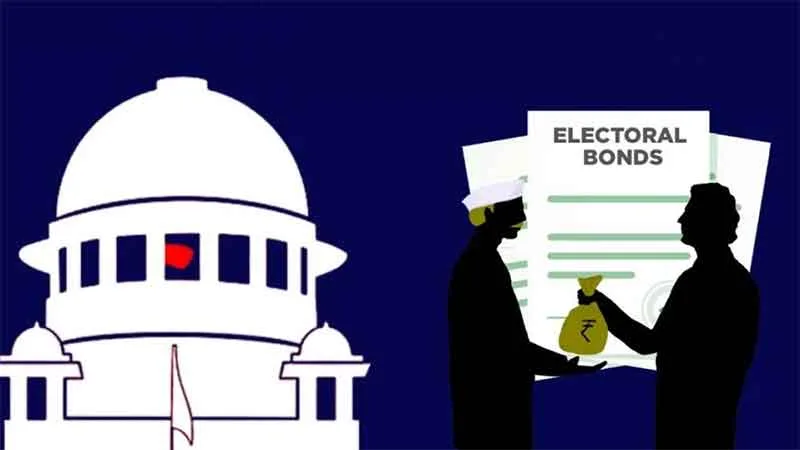
The Supreme Court of India struck down the Electoral Bonds Scheme of 2017, holding it to be unconstitutional. While pronouncing the unanimous verdict of the five-bench constitutional bench, Chief Justice of India DY Chandrachud held that anonymous electoral bonds are violative of the right to information under Article 19(1)(a) of the Constitution.
As per a report in LiveLaw, the CJI stated “Crucial aspect of expansion of right to information is that it is not confined to state affairs but also includes information necessary for participatory democracy. Infringement to the right to information is not justified by the purpose of curbing black money.”
The constitution bench, also comprising Justices Sanjiv Khanna, BR Gavai, JB Pardiwala and Manoj Misra, had dealt with two major issues in the said case- whether the non-disclosure of information on voluntary contributions to political parties in accordance to the electoral bond scheme and the amendments to Section 29C of Representation of the People Act, Section 183(3) of the Companies Act, Section 13A(b) of the Income Tax Act should be held violative of the right to information under Article 19(1)(a) of the Constitution, and second, whether unlimited corporate funding to political parties as envisaged by the amendment to Section 182(1) of the Companies Act violates the principle of free and fair elections.
Observing the scheme to be unconstitutional, the bench also quashed the amendments made to the Income Tax Act and the Representation of People Act which had made the donations anonymous. In furtherance to this, the bench observed that the amendment to Section 182 of Companies Act becomes otiose in view of the unconstitutionality of the electoral bonds scheme.
While delivering the judgment, CJI said “A company has graver influence on the political process than contributions by individuals. Contributions by companies are purely business transactions. Amendment to Section 182 Companies Act is manifestly arbitrary for treating companies and individuals alike.”
The bench further held that the union was unable to satisfy the court on the restrictive means test and that means other than electoral bonds can be used to achieve the purpose of curbing black money.
The CJI stated “Union has been unable to establish the measure adopted in clause 7(4)(1) of the electoral scheme is the least restrictive measure.”
Furthermore, the court directed that the issuing bank, i.e., the State Bank of India, shall forthwith stop the issue of electoral bonds and will have to furnish the details of donations through electoral bonds and the details of the political parties which received the contributions. The said details have been directed by the Court to be submitted to the Election Commission of India (ECI) by March 6, which shall then be published by the ECI on their official website by March 13.
With this, the Court observed that while the privacy of donors is important, transparency in political funding cannot be achieved by granting absolute exemptions. Notably, a total of two judgments have been written in the case, with the lead judgment having been penned down by CJI Chandrachud and a concurring judgment with a slightly different opinion by Justice Khanna. The judgment authored by CJI Chandrachud was on the behalf of Justices Gavai, Pardiwala, and Misra as well.
What are electoral bonds?
In the month of February 2017, as the Union Budget was unveiled, the Former Finance Minister Arun Jaitley voiced his unease about the glaring absence of a transparent mechanism for financing political parties. He lamented that even after seven decades of independence, this vital component crucial to ensuring equitable and just elections continued to elude the nation.
To tackle this challenge head-on, he had introduced the Electoral Bonds Scheme with an aim to “cleanse the system” and revolutionize political funding.
An electoral bond is like a promissory note. The Union unveiled the Electoral Bond Scheme, 2018 through a notification sent out on 2 January 2018. Interestingly, an electoral bond does not reveal the identity of the buyer or payee, adding an element of secrecy to donor transactions. Anyone who is a citizen of India or incorporated/established in India can acquire bonds individually or team up with other individuals for this clandestine contribution. Authorized branches of the State Bank of India hold the privilege to issue these electoral bonds. To partake in this covert transaction, one must either visit an authorized SBI branch in person or make use of their online portal.
However, the privilege of electoral bonds is restricted to only a political party, which had secured more than 1 percent of votes in the previous general election to the Legislative Assembly. The party must also encash the issued bond within15 days, discrepancy in doing this will lead to the donation of the amount to the Prime Minister Relief Fund.












































